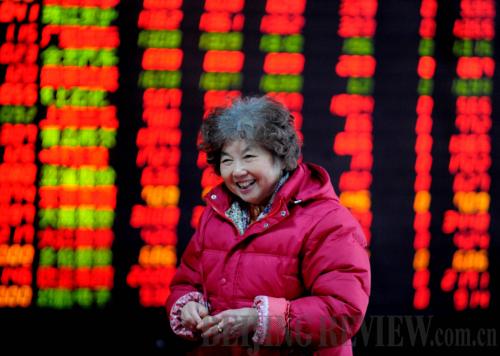|
 |
|
An investor smiles after watching stock prices at a securities company in Shenyang, capital of Liaoning province.[Photo/bjreview.com.cn] |
People are concerned whether the investor protection mechanism can be effectively implemented
In 2013 there were many events in China's capital market that made investors both angry and disappointed. One such event was the fraud during the initial public offering (IPO) by Wanfu Biotechnology (Hunan) Agricultural Development Co Ltd.
Soon after the company was listed at ChiNext, the country's growth enterprise board, in 2011, there were reports claiming that Wanfu became qualified for the IPO by overstating its business achievements, but the company denied the allegations. Under continuing investigation and condemnation by experts and the media, Wanfu admitted on March 2, 2013, that it cooked its aggregate revenues and profits during 2008-11, exaggerating revenues by 740 million yuan ($121 million) and profits by 180 million yuan ($29 million).
Wanfu's stock price dropped from 31.95 yuan ($5.23) per share at the time of its IPO to 5.65 yuan ($0.92) per share when its stocks were suspended for trading on April 22, 2013.
In the case of insider trading and IPO fraud, small investors suffer the worst losses.
On Dec 27, 2013, the State Council issued a statement on the protection of the interests of small investors in the capital market. This is China's first document with overall and systematic provisions in this regard.
Since the statement was issued by the State Council, the country's cabinet, instead of the China Securities Regulatory Commission (CSRC), it has attracted closer attention and is considered a guideline on investor protection and the sound development of China's capital market.
Deng Ge, spokesman of the CSRC, said the statement has made arrangements for the basic rights of investors that they are most concerned about, such as the right to returns, the right to know, the right to take part in supervision and the right to seek compensation. Therefore, it is a milestone in the development of China's capital market.
Cao Fengqi, Director of the Finance and Securities Research Center at Peking University, said methods to protect small investors used to be proposed by the CSRC, therefore State Council involvement is more authoritative.
According to Cao, experience from mature markets indicates that investor protection is the core of the capital market supervision and legal system. The statement is just the start of investor protection, with the government to also revise the Securities Law and formulate other supporting measures.
Vulnerable investors
Although they have almost no experience in wealth management or knowledge of securities, small investors constitute the majority in China's capital market.
According to a report from the Asset Management Association of China, in the present Chinese capital market, more than 99 percent of investors have an investment value below 500,000 yuan ($81,800), but contribute up to 60 percent of the total stock trading volume.
They are weak in terms of risk tolerance, self-protection and obtaining information; therefore, protecting small investors is the most crucial step in the development of China's capital market.
In the past, protection of small investors was only mentioned in the rules of stock exchanges or the CSRC and there were no detailed measures. Since the investor protection is not well implemented, most securities companies place value on business scale and performance more than investors' interests.
The report said the most important contribution of the statement is that it changes market focus from financiers to investors, from listed companies to small investors.
Wang Yong, an analyst from CITIC Securities Co Ltd, said the number of small investors in China is much bigger than those in the capital markets of developed economies. Small investors don't have as many funds as large institutions do, but they are the foundation of the market, hence there must be mechanisms to protect them. Learning from foreign markets does not mean simply copying their systems; there should also be innovations and improvements based on China's condition. For this, the State Council's statement deserves appreciation.
